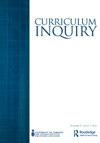Land acknowledgements in the academy: Refusing the settler myth
IF 1.6
3区 教育学
Q2 EDUCATION & EDUCATIONAL RESEARCH
引用次数: 10
Abstract
Abstract Land acknowledgements have become almost ubiquitous in post-secondary education settings in Canada. However, the origins and widespread popularity of these practices has gone largely unexamined. In this article, the literature on land acknowledgement practices in Canada is reviewed, focusing in particular on the growing criticisms of these acknowledgements. While initially understood as culturally based political statements to resist the erasure of Indigenous presence and colonial violence, these practices have been repurposed in settler institutions. Land acknowledgements have now become deeply embedded in state-sponsored “forgive-and-forget” reconciliation efforts that seek to absorb Indigenous peoples into the body politic of “good Canadians”. This shift in acknowledgement practices has been increasingly criticized for devolving into box-ticking exercises, strictly symbolic gestures, moves to settler innocence, and attempts to rewrite Indigenous and settler colonial history. Analysing the literature using a lens of settler colonial theory, I argue that institutionalized land acknowledgements in Canada do not pertain to actual Indigenous peoples. These statements reference a mythical fabrication of Indigenousness that is consistent with settler dreams of benevolence, innocence, and the end of colonization in Canada. This co-optation of Indigeneity has important implications for recent efforts to “Indigenize the academy” through the inclusion of Indigenous knowledges in curriculum. In response to this subversion of Indigenous knowledges, a stance of refusal on the part of Indigenous members of the academy can be a demonstration of agency in institutions in which we are relatively powerless.学术界的土地承认:拒绝定居者神话
土地确认在加拿大的高等教育环境中几乎无处不在。然而,这些做法的起源和广泛流行在很大程度上没有得到检验。在本文中,对加拿大土地承认实践的文献进行了回顾,特别关注对这些承认的日益增长的批评。虽然最初被理解为以文化为基础的政治声明,以抵制消除土著存在和殖民暴力,但这些做法已在定居者机构中重新使用。如今,土地认领已深深植根于国家发起的“宽恕与遗忘”和解努力中,这些努力旨在将土著人民纳入“好加拿大人”的政治体系。这种承认实践的转变被越来越多地批评为打勾练习,严格的象征性姿态,对定居者清白的举动,以及改写土著和定居者殖民历史的企图。从移民殖民理论的角度分析文献,我认为加拿大制度化的土地承认并不适用于实际的土著人民。这些声明引用了一个虚构的土著,这是一致的移民梦想的仁慈,天真,和结束殖民在加拿大。这种对土著知识的吸收对最近通过将土著知识纳入课程而“使学院本土化”的努力具有重要意义。为了回应这种对土著知识的颠覆,学术界土著成员的拒绝立场可以证明我们在相对无能为力的机构中的能动性。
本文章由计算机程序翻译,如有差异,请以英文原文为准。
求助全文
约1分钟内获得全文
求助全文
来源期刊

Curriculum Inquiry
EDUCATION & EDUCATIONAL RESEARCH-
CiteScore
3.10
自引率
17.60%
发文量
37
期刊介绍:
Curriculum Inquiry is dedicated to the study of educational research, development, evaluation, and theory. This leading international journal brings together influential academics and researchers from a variety of disciplines around the world to provide expert commentary and lively debate. Articles explore important ideas, issues, trends, and problems in education, and each issue also includes provocative and critically analytical editorials covering topics such as curriculum development, educational policy, and teacher education.
 求助内容:
求助内容: 应助结果提醒方式:
应助结果提醒方式:


